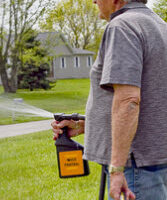MILLIONS AWARDED TO VICTIM OF CANCER-CAUSING ROUNDUP WEED KILLER

A San Francisco jury recently found the mega-company Monsanto liable for a school groundskeeper’s lymphoma that he said developed after years of applying the company’s trademarked Roundup weed killer.
The $289-million verdict in San Francisco County Superior Court is certain to add momentum to a multi-front battle to ban Roundup’s main active ingredient, glyphosate. The compound is applied to millions of acres of crops, many of which have been genetically modified to withstand the herbicide.
Monsanto Company was an agrochemical and agricultural biotechnology corporation. It was headquartered in Creve Coeur, Greater St. Louis, Missouri. Monsanto developed Roundup, a glyphosate-based herbicide in the 1970s, and became a major producer of genetically engineered crops. In September 2016, Bayer announced its intent to acquire Monsanto for US$66 billion. After gaining US and EU regulatory approval, the sale was completed on June 7, 2018.
Monsanto’s roles in agricultural changes, biotechnology products and lobbying of government agencies and roots as a chemical company resulted in controversies. The company once manufactured controversial products such as the insecticide DDT, PCBs, Agent Orange and recombinant bovine growth hormone. Its seed patenting model was criticized as biopiracy and a threat to biodiversity.
The jury deliberated three days before awarding $39 million in compensatory damages and $250 million in punitive damages to groundskeeper DeWayne Lee Johnson, 46. He claimed that years of applying Monsanto’s Roundup and Ranger Pro to school properties in a Bay Area suburb of Benicia caused his incurable non-Hodgkin’s lymphoma.
Activists, who have long battled to ban glyphosate, lauded the decision in the closely watched trial.
“Monsanto made Roundup the OxyContin of pesticides, and now the addiction and damage they caused have come home to roost,” said Ken Cook, president of Environmental Working Group. “This won’t cure DeWayne Lee Johnson’s cancer, but it will send a strong message to a renegade company.”
“The jury found Monsanto acted with malice and oppression because they knew what they were doing was wrong and doing it with reckless disregard for human life,” said Robert F. Kennedy Jr., one of Johnson’s attorneys, according to the Associated Press.
“This should send a strong message to the boardroom of Monsanto,” Kennedy added.
The verdict “signals a turning tide,” said Linda Wells, Midwest organizing director for Pesticide Action Network. “It’s time to get carcinogenic pesticides off the market, and fight for the protective regulations we all deserve,” Wells said.
Monsanto, which continues to be run independently after merging earlier this year with German agro-industrial giant Bayer AG, said in a statement that it will appeal the verdict.
“We are sympathetic to Mr. Johnson and his family,” said Scott Partridge, Monsanto’s vice president of global strategy. “Today’s decision does not change the fact that more than 800 scientific studies and reviews — and conclusions by the U.S. Environmental Protection Agency, the U.S. National Institutes of Health and regulatory authorities around the world — support the fact that glyphosate does not cause cancer, and did not cause Mr. Johnson’s cancer.”
The bulk of glyphosate was sprayed on tens of millions of acres of corn and soy in the Midwest. But California growers also applied it to more than 200 crops across 4 million acres, including 1.5 million acres of almonds, making it their most widely used herbicide, according to the California Department of Pesticide Regulation.
Having inherited a company long vilified by environmental activists as “Monsatan,” Bayer faces high potential liabilities from hundreds of similar lawsuits, along with a battle over adding a cancer warning label on products sold in California.
Johnson’s is the first of hundreds of cancer-patient cases against Monsanto and could be a bellwether of what lies ahead for the company.
A U.S. District Court judge earlier this year temporarily halted moves by California to require a cancer warning label under Proposition 65, the Safe Drinking Water and Toxic Enforcement Act, passed by voters in 1986.
California’s decision to include glyphosate on its list of chemicals linked to cancer followed a 2015 ruling by the Europe-based International Agency for Research on Cancer that the chemical is a “probable” carcinogen.
The U.S. EPA as well as its counterpart agencies in the European Union have disagreed with the conclusion reached by that panel, which is part of the World Health Organization. Last December, the U.S. EPA ruled that glyphosate was “not likely” to cause cancer.
Nationwide, growers have used an estimated 1.8 million tons of the chemical since it was introduced in the mid-1970s, according to government and industry estimates.
California’s Office of Environmental Health Hazard Assessment, the agency that listed the chemical as a probable carcinogen, is finalizing its regulation establishing a “safe” threshold under which glyphosate products would be exempt from the Proposition 65 warning provisions.
Contact The Matassini Law Firm, P.A. for a free, confidential evaluation of your product safety claim. Since 1976, we have been assisting victims of harmful consumer products seek justice for their injuries and damages. Visit us www.matassinilaw.com .
